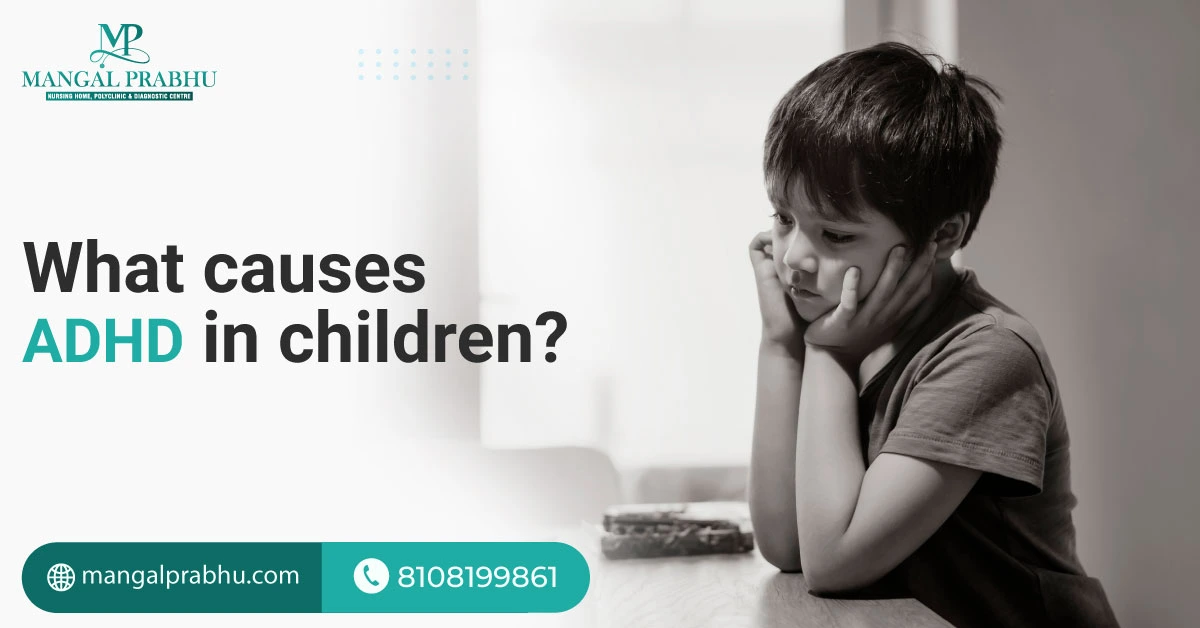
Attention-deficit Hyperactivity Disorder is a neurological condition that affects the child’s ability to concentrate and self-control. Children with ADHD tend to behave differently and often struggle with family relationships, socializing, and maintaining good academic performance. This neurodevelopmental disorder affects millions of kids worldwide.
Although it can’t be cured and might even last till adulthood, a pediatrician in Navi Mumbai can help you manage its symptoms and improve your quality of life. Let’s see what causes ADHD in children.
What causes ADHD in children?
1) Genetic Factors
ADHD runs in families. Kids with parents, siblings, or a blood relative with this condition are more likely to develop it than other kids with no such genetic history. In fact, studies show that children of parents with ADHD are 50% at an increased risk of developing this neurodevelopmental disorder, and those with elder siblings with ADHD have a 30% risk.
Researchers haven’t discovered a single gene responsible for an increased risk, though. It’s believed that a combination of genes plays a part in making a kid more vulnerable to attention-deficit hyperactivity disorder.
2) Environmental Influences
Hyperactivity and inability to self-control are observed in children with poor brain development. One of the reasons that may contribute to this is lead exposure at a young age. Lead can interfere with your child’s neurodevelopmental milestones.
Prenatal exposure to certain chemicals and toxic substances is also linked to ADHD in children. If the mother smokes, drinks alcohol, or works in an environment where she’s exposed to lead, pesticides, and other industrial chemicals, the risk of the offspring developing ADHD increases. The environment at home can also affect the risk.
3) Neurobiological Factors
Children with ADHD have a different brain structure than normal kids. Neurotransmitters, such as dopamine and norepinephrine, may not be at normal levels, affecting the child’s ability to focus, control impulses, and execute tasks without getting distracted.
4) Lifestyle and Diet
Diet isn’t directly linked to ADHD, but it’s possible that consumption of certain foods can aggravate your symptoms. If your child eats lots of sugary foods and preservatives, they might be at an increased risk of getting ADHD. The symptoms can also be seen in nutrient-deficient children, particularly those with a diet that lacks omega-3 fatty acids, iron, and vitamin D.
Another factor is lifestyle. It’s not considered a direct cause, but certain lifestyle choices can worsen your symptoms. For instance, ADHD can interfere with your sleep routine. So, having a consistent bedtime routine and good quality sleep can help.
How to Manage Your Symptoms
ADHD treatment in Navi Mumbai focuses on managing symptoms. In addition to medication and behavioral therapies, these tips can help you with ADHD symptoms:
- Exercise regularly to improve blood flow to the brain
- Limit screen time to prevent overstimulation of the brain
- Create a calm and stress-free environment at home
- Be supportive and patient
- Provide a balanced diet full of essential vitamins and nutrients to your child
A few tips can go a long way in managing ADHD symptoms in children. With support and a good diet, your children can focus better and have good impulse control.
